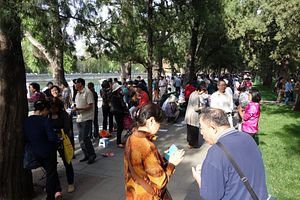Every Sunday in Beijing’s Zhongshan Park, thousands of parents and grandparents gather to find love for their children in “marriage markets.” Older family members visit these parks to advertise their child’s eligibility as a potential spouse, meeting and speaking with other families to arrange meetings between their children.
Marriage markets are not unique to Beijing. The largest and most famous is located in People’s Park in Shanghai, and others exist in many large Chinese cities, including Guangzhou and Chengdu. Actor Ian McKellen famously visited the Shanghai market and made his own sign in Mandarin.
No matter the location, the dynamics of a marriage market are orderly. Family members will post handwritten 8.5 x 11” signs on the sidewalk with information about their child and the requirements for interested partners, including education level, material possessions, and physical attributes. Requirements can include owning a house and a car, having attended Tsinghua or Peking University (the top two universities in China), and minimum salaries.
If families attend the markets with both parents and grandparents, two or three will stand by the sign while the others wander through the park searching for matches. Families tend to stake out spots, so it is uncommon to see a family member wandering while holding a sign. It is even more uncommon to see someone advertising themselves, let alone a foreigner.
Rex Simons, a Master’s graduate from Peking University in Beijing, had the unique experience of working with China’s primary news outlet, CCTV, to explore obscure elements of Chinese culture from a foreign perspective through a series of online videos. One featured marriage markets by way of the “Chinese Dating Corner” found in Zhongshan Park, a park close to the famous Forbidden City.
On a Sunday in mid-December, Simons went to Zhongshan Park with a camera crew to learn more about the markets. Even though it was just 22 degrees Fahrenheit, there were still thousands at the park. Although walking around the park with a camera crew drew attention, Simons had a hard time finding interviews as parents were reluctant to be filmed for fear of being mocked. Once Simons made his own sign, however, he started to speak with interested parents. As Simons describes, “It was strange to balance acting so as to showcase what the market is like, while also trying to think what I do care about in a partner all on camera.”
While Simons did meet educational requirements, he fell short in others. “I was surprised at how important having a car and a house is to local parents,” Simons says. Besides not owning his own car, Simons also found himself outside of the typical age range. “You would see advertisements for partners between the ages of 25-30. I also spoke with parents who had 28, 29, and 30-year old daughters… they were more concerned than I anticipated because of the concept of shengnü, or ‘leftover women’ in China.”
“Leftover women,” as Vicky Ge Huang noted in a 2016 article for The Diplomat, is “a derogatory term, usually reserved for Chinese women who have failed to marry by the age of 30 despite higher income and educational background.” On the other side, parents with male children were concerned about finding a partner because of China’s gender imbalance, where census data showed there were 118 males to 100 females in China in 2010.
The underlying similarity between parents and grandparents’ concerns falls into two camps: Either their children haven’t found love because they are apathetic (i.e. too busy with work, no time to date), or because they just haven’t been successful. Marriage markets seek to address this while also tackling a crucial piece of Chinese dating culture: family approval. The initial agreement happens between parents and grandparents, who are often the most difficult to appease when it comes to the partner of their single child and grandchild.
While children may have the obligation to pursue the date that was arranged for them, the markets are not necessarily orchestrating the traditional concept of an arranged marriage. When Simons asked if the children have a choice to date the potential arranged match, one man said, “It’s totally up to the children. They are the masters of their world.”
The term “marriage market” is an accurate description to an extent. The market’s results of third party arrangements does seem to commodify children and their potential partners. But in reality, Simons says it is a very different situation: “It’s more like opportunities, rather than arrangements. Just like online dating apps, including Tantan, Momo, and Tinder, there are lots of matches, lots of opportunities, and you don’t have to pursue every one. The difference is between online and offline, and who is doing the swiping.”
By taking matching offline and into the hands of families, marriage markets build upon the long-standing tradition of building familial relationships first. Although it didn’t work out for Simons, young Chinese adults may be more successful through family connections made in a market, rather than by swiping right.

































